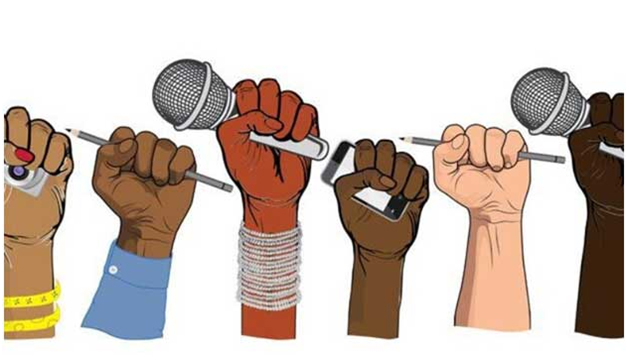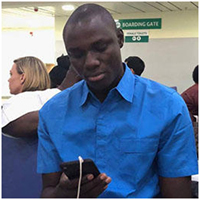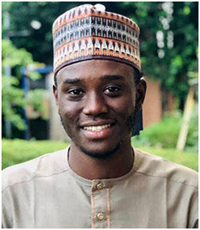Africa, Civil Society, Democracy, Global Governance, Headlines, Human Rights, Press Freedom, TerraViva United Nations
Jonathan Rozen* is Senior Africa Researcher at Committee to Protect Journalists (CPJ)

– As reporters for Nigeria’s Premium Times newspaper, Samuel Ogundipe and Azeezat Adedigba told CPJ they spoke often over the phone. They had no idea that their regular conversations about work and their personal lives were creating a record of their friendship.
On August 9, 2018, Ogundipe published an article about a communication between Nigeria’s police chief and vice president. Days later, police investigating his source issued a written summons, CPJ reported at the time.
It was not addressed to Ogundipe and made no mention of his article or the charges he would later face of theft and possession of police documents. Instead, as Ogundipe recounted, police called Adedigba for questioning in connection with a slew of serious crimes, allegations that evaporated after police used her phone to summon her friend to the station.
Ogundipe’s experience is one of at least three cases since 2017 where police from across Nigeria used phone records to lure and then arrest journalists currently facing criminal charges for their work.
In each case, police used the records to identify people with a relationship to a targeted journalist, detained those people, and then forced them to facilitate the arrest.
The police methods reinforce the value of internet-based, encrypted communications at a time when authorities have also targeted journalists’ phones and computers to reveal their sources. Those prosecuted in all three cases are free on bail.

Nigerian journalist Samuel Ogundipe (Photo: Samuel Ogundipe)
“If the police called me and said we have something to ask you, I would go there…this is just their tactics,” Ogundipe said.
Ogundipe and Adedigba told CPJ that police made no secret of the way they had established their relationship, showing them each call records they claimed to have obtained from the pair’s cellphone network providers—Nigeria-based 9mobile, a subsidiary of the UAE-based Etisalat telecom company, and South Africa-based MTN, respectively.
“[Police have] been checking who I’ve been talking to…[in order to] see who was close enough to me to be used as bait,” Ogundipe added.
CPJ’s repeated calls in late 2019 and early 2020 to Nigerian police spokesperson Frank Mba rang unanswered.
The 2003 Nigerian Communications Act mandates that network service providers assist authorities in preventing crime and protecting national security. Regulations for enforcing it grant senior police officials the power to authorize requests to obtain “call data” from telecom companies without a judicial warrant, according to CPJ’s review.
That data includes where and when regular phone calls and SMS messages took place and between which numbers, according to documents reviewed by CPJ and interviews with three individuals with knowledge of police requests for call data in Nigeria. All three requested not to be named for fear of reprisal.
Nigeria has over 184 million active mobile phone lines, with roughly two million lines added every month to service its estimated 190 million people, according to 2019 data released by the national telecom regulator, the Nigerian Communications Commission (NCC). SIM card ownership for these lines is tracked under a 2011 regulation, which CPJ reviewed, mandating the collection of personal information, including fingerprints and photos, that police can access without a warrant as long as a senior-ranking officer gives written approval.
Other NCC regulations, released in October 2019 and reviewed by CPJ, detail police permissions to intercept communications under certain circumstances.
At the time of publishing, Ogundipe told CPJ his next court date had yet to be scheduled, but two journalists who were taken into custody at the end of 2019–Gidado Yushau and Alfred Olufemi–were preparing for their fifth hearing scheduled in Kwara State for March 4.
Similar to Ogundipe and Adedigba, police used call records to identify individuals that could be used to lead them to their targets, those affected told CPJ.

Nigerian journalist Gidado Yushau (Photo: Gidado Yushau)
Yushau, publisher of The News Digest website, and Olufemi, a freelance reporter, were charged in November 2019 with criminal conspiracy and criminal defamation in connection with a complaint over a May 2018 News Digest report Olufemi wrote about a factory owned by Sarah Alade, now special adviser to Nigeria’s president. Alade and other representatives of the factory did not answer calls or declined comment when CPJ reported on the case.
The first journalist police used to track down Yushau and Olufemi worked in another city for an unrelated news outlet. Wunmi Ashafa, a Lagos-based journalist with the News Agency of Nigeria (NAN), told CPJ that police tricked her into meeting, then made her summon her colleague, Yusuf Yunus, who in turn was used to facilitate the arrest of the Digest’s web developer, Adebowale Adekoya. The officers claimed to know they were connected from their call records.
Police were “tracking all the people that are calling me, that I’m talking to,” Yunus told CPJ in an interview. “The network provider has said that this line and this line have spoken at this particular hour,” he said police told him. Ashafa and Yunus said they were released after police detained Adekoya.
“I don’t know why they decided to do that,” Ashafa told CPJ, adding that she missed a meeting at her daughter’s school because police involved her. “They apologized to us, to myself and Yunus, that that was the only way they could get [Adekoya].”
Mistaken for the Digest’s publisher, Adekoya described being held for five nights, driven over 1,200 kilometers—including to Abuja and Kwara State—and threatened with detention if he did not lead the officers to Yushau and promise to help bring Olufemi into custody, before his release.

Nigerian journalist Alfred Olufemi. (Photo: Alfred Olufemi)
CPJ reached Peter Okasanmi, a spokesperson with the Kwara State police, by phone in January. He declined to comment on Yushau and Olufemi’s case because the trial was ongoing, but described how police regularly used telecommunications information to make arrests.
“We are able to track the culprits by use of technology through the SIM [cards] that were registered,” Okasanmi said. “Suspects, they are usually like kidnappers…we use all of those gadgets to track their locations and get them arrested…we have our own equipment we are using,” he added, without elaborating.
On November 4, CPJ contacted NCC spokesperson Henry Nkemadu by phone and upon his request sent questions regarding security agencies’ access to communications data, but received no response. Subsequent calls to Nkemadu and other NCC officials went unanswered.
Police used a similar tactic in 2017 to arrest Tega Oghenedoro, the Uyo city-based publisher of the Secret Reporters news website who writes under the pseudonym Fejiro Oliver, CPJ reported this month.
He faces cybercrime charges related to reports alleging corruption in a Lagos-based Nigerian bank and is due in court on May 28, CPJ reported.
Isaac Omomedia, an aide to the governor of Delta State, told CPJ in October 2019 that he did not know Oliver, but that they had a mutual acquaintance, Prince Kpokpogri, the publisher of Integrity Watchdog magazine.
In March 2017, Omomedia arrived at a hotel in Asaba, the Delta State capital where he lives, after receiving a call to collect a parcel from the DHL delivery company, he told CPJ.
Instead, he was met by six police officers who questioned him about Kpokpogri, someone they claimed to know he was in touch with by reviewing his call records. On their instructions, Omomedia said he invited Kpokpogri to a meeting.
Kpokpogri told CPJ that police arrested him upon arrival, drove him over 200 kilometers to Uyo, and told him, in turn, to summon Oliver. The officers had identified him because they had “bugged” both his and Oliver’s phone lines, he remembered them saying. Kpokpogri said police arrested Oliver when he arrived and drove them both over 350 kilometers to Benin City; Oliver was then flown to Lagos and Kpokpogri was released without charge.
Kenneth Ogbeifun, the Lagos-based investigating officer in Oliver’s case, requested emailed questions when contacted for comment by CPJ in January 2020. Follow-up emails and messages went unanswered.
CPJ also reached an officer who confirmed his name as Moses and that he was part of the team that arrested Oliver on behalf of Lagos police, but when asked about how Omomedia and Kpokpogri were used in the arrest, the line disconnected.
Those involved in Oliver’s arrest, and the chain leading to Yushau and Olufemi, told CPJ they relied on the Nigeria-based Globacom, also known as Glo, India-based Airtel, or MTN for their cell phone service.
“I will give you the number used to commit the crime and you have only 60 minutes to produce the details,” the Premium Times quoted Isa Pantami, Nigeria’s minister of communications and digital economy, as saying in late 2019. Operators that failed to produce data would be sanctioned, according to that report.
CPJ called the ministry of communications and digital economy in mid-January. Philomena Oshodin, a deputy director, said that she was not the relevant person to comment before the line went silent; follow up messages went unanswered.
Between November 2019 and January 2020, CPJ reached out to public relations departments at MTN, 9mobile, Airtel, and Glo, and emailed questions to representatives for each about security agencies’ access to telecom user data in Nigeria. None replied with answers by date of publication.
“You’re reporting as a journalist, which is not a crime…[but] you feel you’re being punished,” Ogundipe told CPJ, reflecting on his arrest and prosecution. “It’s very scary…it’s difficult to predict how far these guys will go.”
For information on digital safety, consult CPJ’s Digital Safety Kit.
*Jonathan Rozen is CPJ’s senior Africa researcher. Previously, he worked in South Africa, Mozambique, and Canada with the Institute for Security Studies, assessing Mozambican peace-building processes. Rozen was a U.N. correspondent for IPS News and has written for Al-Jazeera English and the International Peace Institute. He speaks English and French.
